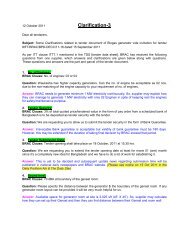Draft for comments only Reviewing existing NGO services for the ...
Draft for comments only Reviewing existing NGO services for the ...
Draft for comments only Reviewing existing NGO services for the ...
You also want an ePaper? Increase the reach of your titles
YUMPU automatically turns print PDFs into web optimized ePapers that Google loves.
credit <strong>for</strong> <strong>the</strong> ultra poor is a slightly modified version of general microcredit and <strong>NGO</strong>s do not<br />
follow any common rules. Activities financed through micro-credit of different <strong>NGO</strong>s also vary<br />
significantly. The ultra poor are considered a high credit risk group and <strong>NGO</strong>s usually offer<br />
specialized schemes <strong>for</strong> financing which can bring high returns within a very short time. Interest<br />
rates and repayment schedule may also differ from general microcredit. Low interest loan with<br />
flexible repayment schedule <strong>for</strong> beef fattening, rickshaw/van pulling, milching cow, goat and poultry<br />
rearing were some of such schemes identified in <strong>the</strong> list. There are also specially designed <strong>NGO</strong><br />
sector programmes <strong>for</strong> <strong>the</strong> ultra poor where participants don’t need to invest anything except<br />
labour. Roadside plantation is such a programme where participants take care of planted trees under<br />
an agreement that after 15-20 years, when <strong>the</strong> trees will matured, <strong>the</strong>y will receive 60% of <strong>the</strong> sold<br />
amount. There are also <strong>NGO</strong>s helping <strong>the</strong> poor in leasing arrangements <strong>for</strong> vegetable and o<strong>the</strong>r robi<br />
crop cultivation. They also sometimes provide free seeds, seedlings of fruit and timber trees and day<br />
old poultry birds.<br />
A third category of inteventions involves <strong>the</strong> provision of different kinds of vocational training.<br />
Several <strong>NGO</strong>s were providing tailoring training to <strong>the</strong> women under <strong>the</strong> government's VGD<br />
programme. It is very important to note that none of <strong>the</strong> <strong>NGO</strong>s, except SDP (a local level <strong>NGO</strong>) in<br />
Kotiadi of Kishoregonj district, provide direct employment to <strong>the</strong> ultra poor. However, different<br />
study results show that <strong>the</strong> ultra poor lack secured and continuous source of income and <strong>the</strong> BRAC<br />
study results show that <strong>the</strong> ultra poor prefer wage employment over credit.<br />
Health support<br />
All <strong>NGO</strong>’s with provision <strong>for</strong> training are also active in creating health awareness. We found few<br />
<strong>NGO</strong>s providing health <strong>services</strong> to <strong>the</strong> ultra poor. Chinna Mukul in Kurigram and World Vision of<br />
Bangladesh in Kalkini, Madaripur provided treatment (including food) to <strong>the</strong> ultra poor <strong>for</strong> Tk. 12.<br />
TMSS in Gaibandha and Proshika in Gopalgonj, VORD in Pangsha, Rajbari, Ganashasthya Kendra in<br />
Sherpur have programmes to provide nutrition <strong>for</strong> pregnant women and children. As part of relief<br />
and rehabilitation programme Proshika in Gopalgonj, AVA in Jamalpur and Udayan Swabalambi<br />
Sangstha in Gaibandha have some provision <strong>for</strong> free or subsidized treatment. Uddog in Palashbari and<br />
Atmwa Unnayan Sangstha in Gaibandha district provide treatment to <strong>the</strong> disable people. Hitaishi<br />
Bangladesh in Kaligonj of Kurigram/Lalmonirhat has water and sanitation programme. Islamic relief<br />
has programme <strong>for</strong> <strong>the</strong> orphans.<br />
Education<br />
Three local level <strong>NGO</strong>s in two thanas of Gaibandha district (Uddog, Hachina Machir Welfare<br />
Association and Atmwa Unnayan Sanhstha), two in Jamalpur (AVA and Swanirbhar Bangladesh), one in<br />
Rajbari (VORD), one in Kurigram/Lalmonirhat (Modern Rural Progressive Society), one in Shirajgonj<br />
(Manob Mukti), Three in Kishoregonj (Swanirbhar Bangladesh, Swanirbhar and Nari Uddogh Kendra) and<br />
one in Sherpur (Ganashasthya Kendra) regions are providing free education support to <strong>the</strong> children<br />
from ultra poor households. In Gopalgonj two large development agencies, Grameen and Proshika,<br />
and a local level <strong>NGO</strong>, GGS, run education programmes. Students in <strong>the</strong>se schools receive free<br />
books.


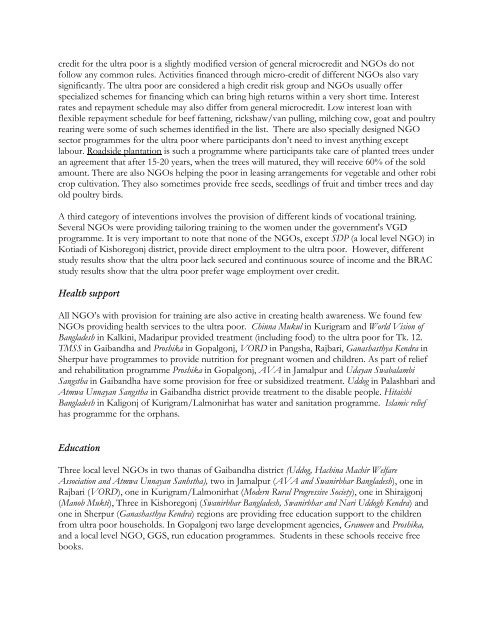
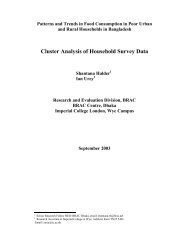
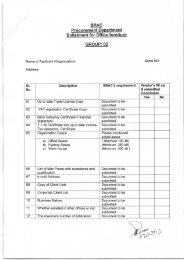
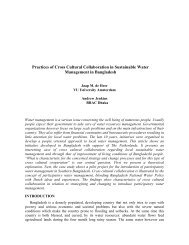
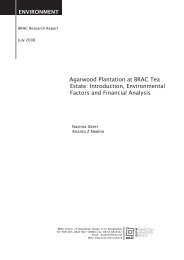
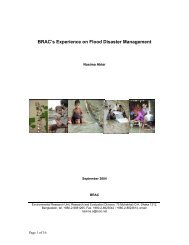
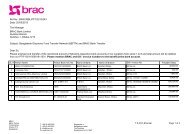
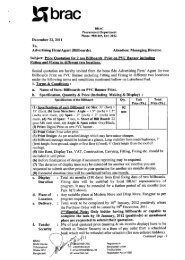
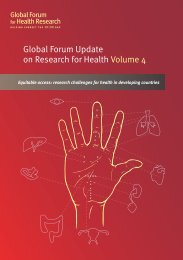
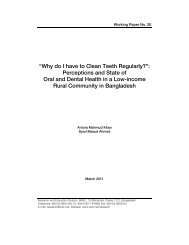
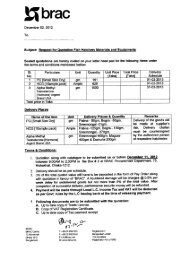

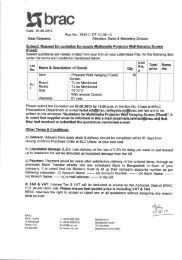
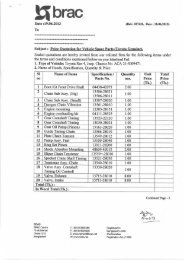
![[re-tender] RFQ for supply of Diesel Generator - Brac](https://img.yumpu.com/44421374/1/186x260/re-tender-rfq-for-supply-of-diesel-generator-brac.jpg?quality=85)
